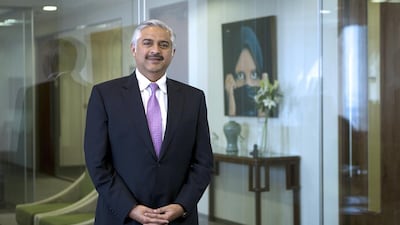Emirati investors are turning “risk-off”, as uncertainty over the price of oil stokes interest in capital guaranteed investment.
While property investment has in the past proved popular among UAE investors, more are looking to diversify their portfolios into fixed income assets such as bonds and sukuk, according to Daffer Luqman, the head of global wealth management at Abu Dhabi Islamic Bank.
“The recent uncertainties in the global economy on the back of lower oil prices have made customers a little bit more cautious in how they invest, and in how they park their cash,” said Mr Luqman.
Mohsin Nathani, the chief executive of Standard Chartered’s UAE operations, said that while on the government level spending was likely to be unchanged, individuals might have less money to spend on consumer items and investments such as stocks and property.
“The impact that you face is that a lot of the individuals who have surplus liquidity, that surplus liquidity goes down,” he said.
Oil, upon which the UAE is reliant to fuel growth, has shed about 60 per cent of its value since June as demand from emerging markets such as China slows and North America increases energy production.
During the fourth quarter of last year alone, crude prices dropped 30 per cent, sparking a similar decline in equity markets in Dubai and Abu Dhabi as well as a more tempered softening of property prices. The UAE is the world’s eighth-largest producer of crude oil and uses revenues to fund about 60 per cent of the federal budget.
“As we saw during the worst of the oil price weakness, equity markets here were affected,” said Tim Fox, the chief economist at Emirates NBD, Dubai’s biggest bank. “Money comes out of speculation. There might be less appetite for risk. There may be a tendency to keep deposits in cash.”
Anecdotal evidence and surveys suggest that property remains the preferred investment among Emirati investors. According to a recent survey by Abu Dhabi Islamic Bank of 1,213 residents holding accounts of more than Dh10,000, 54 per cent of Emirati respondents said they would invest their money in property, followed by 31 per cent who said cash and deposits and 27 per cent in gold, silver and oil.
Despite the recent gloom, Adib’s asset management business has been booming in recent years as affluent local customers opt for financial advisers rather than going it alone, said Mr Luqman.
And just because investors are shying away from risk does not mean they are putting it all in cash. Capital secured financial products, where the initial investment is protected and any returns are shared between the bank and the customer, are in vogue, Mr Luqman said. Sukuk, or Islamic bonds, have also become popular amid a rush of new issues in recent years, he added.
Emirati investors concur. Abdulhakim Binherz, a banker turned lawyer, said that, while he prefers property above all other investments, structured products are an attractive alternative to term deposits offering little interest..
“Recently I saw in the market products that guarantee minimum returns through structured products,” said Mr Binherz. “At least you secure the principal. And that’s attractive because the interest from the bank is very low. So you are better off either investing in real estate, where you get a return of between 7 per cent and 10 per cent, or you do it through structured finance. Because many investors were burnt during the financial crash of 2008, they would prefer to invest through these structured products.”
As a result of that increased demand for fixed income, the average yield on UAE bonds declined eight basis points since the end of November, compared with a seven basis-point increase on the yield on developing-country debt. The average yield on UAE debt was 4.18 per cent on February 11, 252 basis points less than the interest rate on emerging-market debt, according to Bloomberg.
mkassem@thenational.ae
Follow The National's Business section on Twitter

